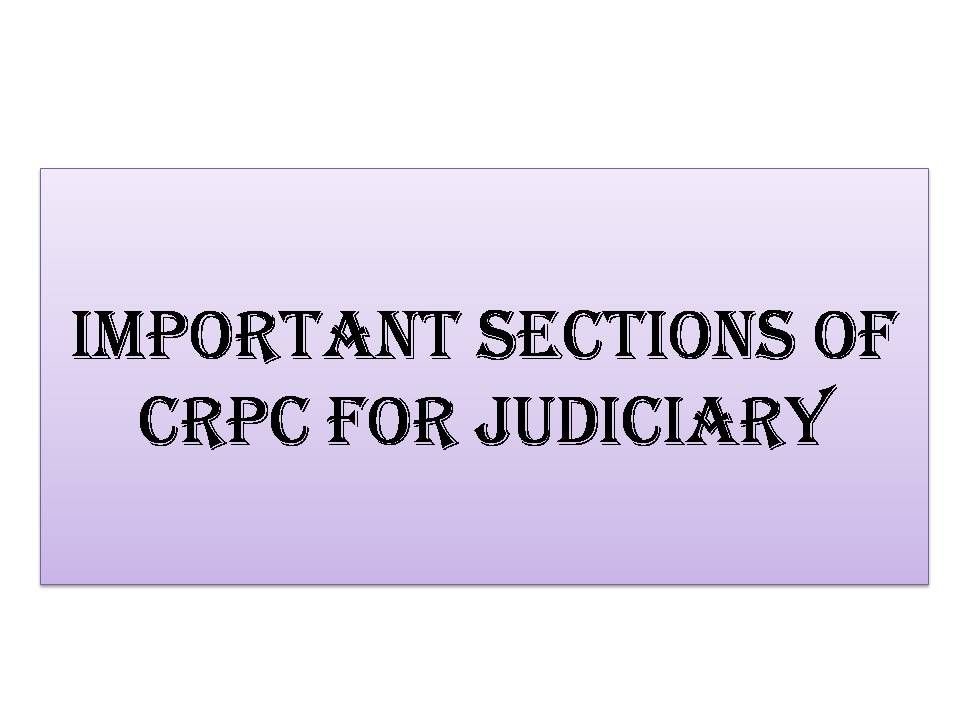Important Sections of CrPC for Judiciary
When studying the Code of Criminal Procedure (CrPC) through its comprehensive bare act or PDF, focusing on the most crucial sections is key. To streamline your exam preparation, here’s a curated list of essential sections you should prioritize. Careful consideration has been given to ensure coverage of all fundamental aspects, encompassing over one hundred fifty sections.
For effective law exam preparation, dedicate significant time to thoroughly understand these important sections of the Criminal Procedure Code.
Important CrPC Sections
Section 1– Short title, extent and commencement
Section 2 – Definitions.
Section 6 – Classes of Criminal Courts.
Section 9 – Court of Session.
Section 10 – Subordination of Assistant Sessions Judges.
Section 11 – Courts of Judicial Magistrates.
Section 12 – Chief Judicial Magistrate and Additional Chief Judicial Magistrate, etc.
Section 13 – Special Judicial Magistrates.
Section 30 – Sentence of imprisonment in default of fine.
Section 31 – Sentence in cases of conviction of several offences at one trial.
Section 41 to Section 54 – Arrest of Persons.
Section 56 – Person arrested to be taken before Magistrate or officer in charge of police station.
Section 57 – Person arrested not to be detained more than twenty-four hours.
Section 59 – Discharge of person apprehended.
Section 61 to Section 69 – Summons.
Section 70 to Section 81 – Warrant of arrest.
Section 82 – Proclamation for person absconding.
Section 83 – Attachment of property of person absconding.
Section 84 – Claims and objections to attachment.
Section 85 – Release, sale and restoration of attached property.
Section 86 – Appeal from order rejecting application for restoration of attached property.
Section 87 – Issue of warrant in lieu of, or in addition to, summons.
Section 88 – Power to take bond for appearance.
Section 93 – When search-warrant may be issued.
Section 97 – Search for persons wrongfully confined.
Section 102 – Power of police officer to seize certain property.
Section 106 – Security for keeping the peace on conviction.
Section 107 – Security for keeping the peace in other cases.
Section 108 – Security for good behaviour from persons disseminating seditious matters.
Section 109 – Security for good behaviour from suspected persons.
Section 110 – Security for good behaviour from habitual offenders.
Section 125 to Section 128 – CHAPTER IX, Order for Maintenance of Wives, Children and Parents.
Section 129 – Dispersal of assembly by use of civil force.
Section 130 – Use of armed forces to disperse assembly.
Section 132 – Protection against prosecution for acts done under preceding sections.
Section 133 – Conditional order for removal of nuisance.
Section 144 – Power to issue order in urgent cases of nuisance or apprehended danger.
Section 154 to Section 176 – CHAPTER XII, Information to the Police and their Powers to Investigate.
Section 177 to Section 189 – CHAPTER XIII, Jurisdiction of the Criminal Courts in Inquiries and Trials.
Section 190 – Cognizance of offences by Magistrates.
Section 195 – Prosecution for contempt of lawful authority of public servants, for offences against public justice and for offences relating to documents given in evidence.
Section 196 – Prosecution for offences against the State and for criminal conspiracy to commit such offence.
Section 198 – Prosecution for offences against marriage.
Section 199 – Prosecution for defamation.
Section 200 to Section 203 – CHAPTER XV, Complaints to Magistrates.
Section 204 – Issue of process.
Section 211 to Section 224 – CHAPTER XVII, The Charge.
Section 225 to Section 237 – CHAPTER XVIII, Trial Before a Court of Session.
Section 238 to Section 250 – CHAPTER XIX, Trial of Warrant Cases by Magistrates.
Section 251 to Section 259 – CHAPTER XX, Trial of Summons Cases by Magistrates.
Section 260 – Power to try summarily.
Section 261 – Summary trial by Magistrate of the second class.
Section 262 – Procedure for summary trials.
Section 265A to Section 265L – CHAPTER XXIA, Plea Bargaining.
Section 300 – Person once convicted or acquitted not to be tried for the same offence.
Section 304 – Legal aid to accused at State expense in certain cases.
Section 307 – Power to direct tender of pardon.
Section 311 – Power to summon material witness, or examine person present.
Section 313 – Power to examine the accused.
Section 315 – Accused person to be a competent witness.
Section 320 – Compounding of offences.
Section 366 – Sentence of death to be submitted by Court of Session for confirmation.
Section 368 – Power of High Court to confirm sentence or annul conviction.
Section 395 – Reference to High Court.
Section 401 – High Court’s powers of revision.
Section 436 – In what cases is bail to be taken.
Section 436A – Maximum period for which an undertrial prisoner can be detained.
Section 437 – When bail may be taken in case of a non-bailable offence.
Section 437A – Bail requires the accused to appear before the next appellate Court.
Section 438 – Direction for grant of bail to person apprehending arrest.
Section 439 – Special powers of High Court or Court of Session regarding bail.
Section 460 – Irregularities which do not vitiate proceedings.
Section 461 – Irregularities which vitiate proceedings.
Section 468 – Bar to taking cognizance after lapse of the period of limitation.
Section 482 – Saving of inherent power of High Court.
These sections form the core of the Criminal Procedure Code. Utilize this compilation to prepare effectively for both competitive exams and college semester exams. The list is extensive and covers many important aspects.

























